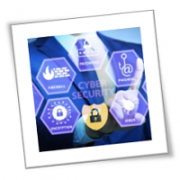Cyberattacks target businesses of all sizes. While large corporations often grab headlines, small businesses are increasingly becoming prime targets due to their often weaker security defenses. Fortunately, by following the tips in this article, you can enhance your business’s cybersecurity posture.
Secure your cloud storage
Cloud storage provides a convenient and cost-effective solution for storing data. However, not all cloud providers prioritize security. To protect your sensitive information, select a reliable platform that offers strong encryption and access controls.
Fortify your network
Your network is the backbone of your business operations, connecting all company devices such as computers, printers, smartphones, and routers. Unfortunately, all connected devices can be entry points for cybercriminals.
To protect your network, use strong, unique passwords for every device and enable multifactor authentication (MFA) whenever possible. MFA adds another layer of security by requiring multiple forms of verification such as a password and a code sent to your phone.
Moreover, you should secure your Wi-Fi network with a robust password and create a separate guest network for visitors. Ensure your Wi-Fi is encrypted with the latest standard, WPA3, to prevent unauthorized access.
Invest in extra security tools
Bolstering your business’s digital defenses requires more than just basic security measures. Consider implementing these additional tools:
- Virtual private network – creates a secure, encrypted connection between your devices and the internet
- Firewall – monitors incoming and outgoing traffic and blocks suspicious activity
- Intrusion detection and prevention systems – monitor network traffic for suspicious activities and block such activities in real time
- Email security – detects and blocks malicious emails
- Data loss prevention – keeps sensitive data from being accidentally or maliciously shared outside your organization
Keep software up to date
It’s tempting to ignore those software update notifications, but doing so can leave your system vulnerable. Software updates often include patches that plug security holes that cybercriminals can exploit. By promptly installing updates, you can strengthen your defenses.
Back up company data
Ransomware attacks are a serious business threat. They encrypt critical data, holding it hostage until a ransom is paid. Implementing a robust backup strategy is crucial for protecting your data and minimizing disruption if you suffer a ransomware attack.
Limit employee access to the company network
Believe it or not, many cyberattacks start from within a company. To minimize the damage caused by an insider threat, grant employees only the necessary permissions to perform their job functions. Regularly review and adjust employee permissions, and promptly revoke access when employees leave the company.
Educate your team
Many cyberattacks happen because employees make mistakes. They might click on a suspicious email, give away their password, or use weak passwords.
To prevent human error, train staff to recognize and avoid common cyberthreats, create strong passwords, and handle sensitive information securely. Conducting regular cybersecurity training and cyberattack simulations can reduce the risk of breaches.
Create a security culture
Cybersecurity shouldn’t be solely the IT department’s responsibility but rather every employee’s. Involve employees in security initiatives and encourage them to report suspicious activities. By fostering a company-wide security culture, you can create a stronger and more resilient organization.
These steps might seem simple, but they go a long way in safeguarding your business from cyberattacks.
Not sure where to begin? Don’t worry, you can turn to our IT experts for help. We offer comprehensive security solutions customized to your specific needs. Get in touch with us today to discover how we can help you build a strong cybersecurity defense for your business.
If you are looking for an expert to help you find the best solutions for your business talk to GCInfotech about a free technology assessment
Published with consideration from TechAdvisory.org SOURCE



